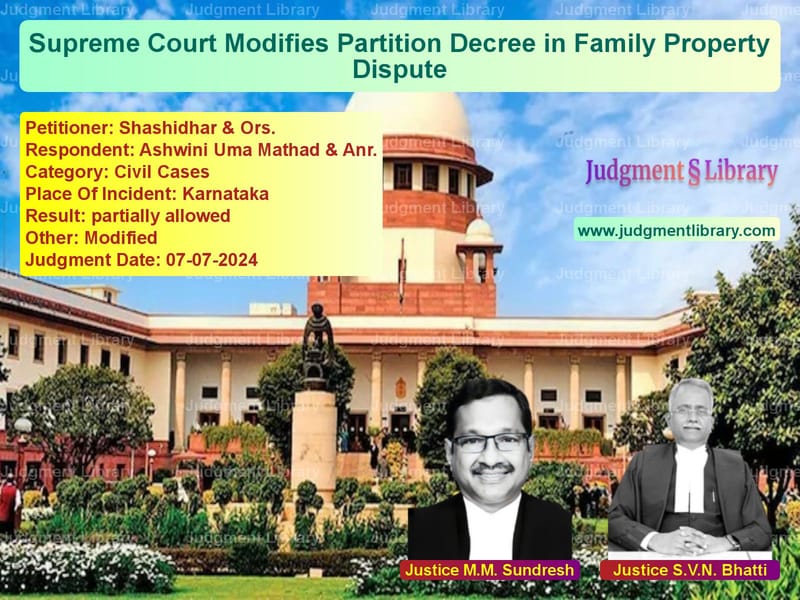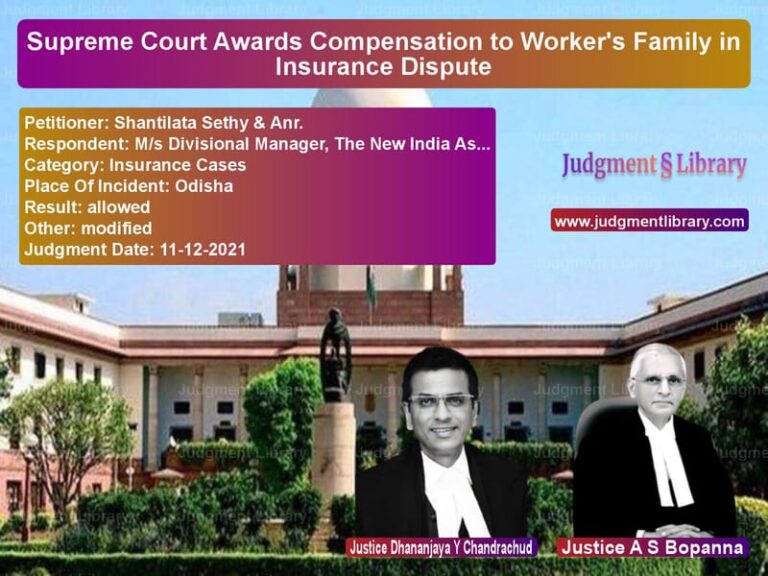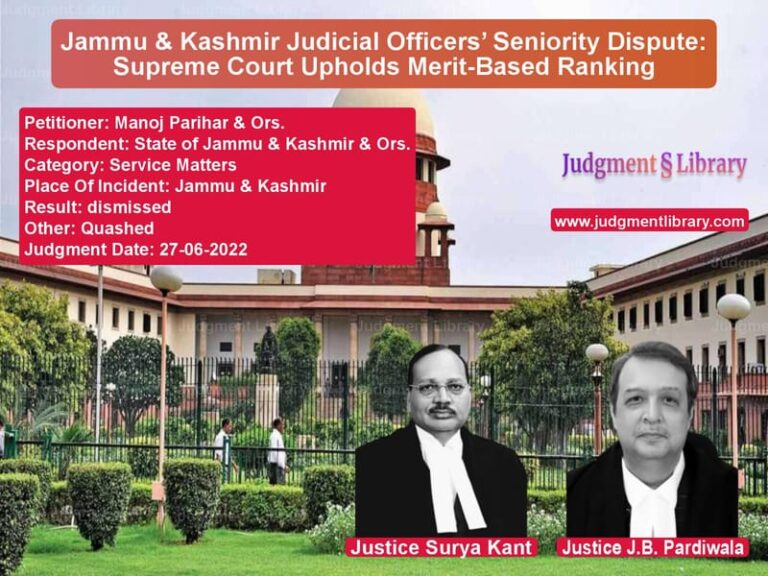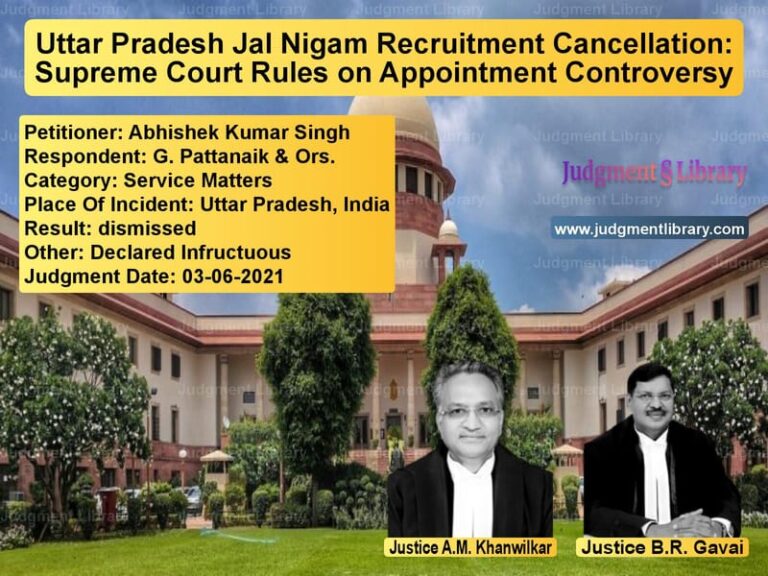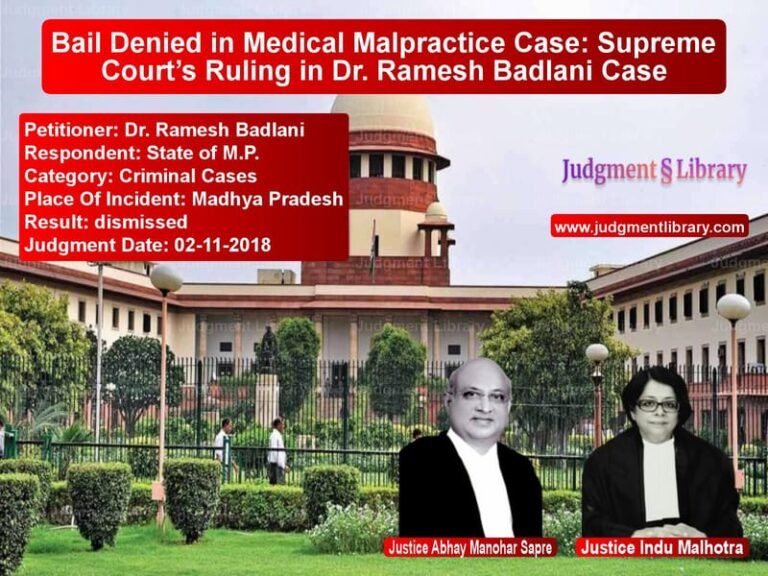Supreme Court Modifies Partition Decree in Family Property Dispute
The case of Shashidhar & Ors. v. Ashwini Uma Mathad & Anr. revolves around a family property dispute concerning partition and inheritance. The Supreme Court, in its judgment dated July 8, 2024, ruled on the division of ancestral and self-acquired properties while modifying the High Court’s partition decree. The Court held that certain properties did not qualify as ancestral and should be excluded from the partition.
This judgment highlights the principles of Hindu coparcenary law, the classification of ancestral and self-acquired properties, and the rights of legal heirs in a joint family property.
Background of the Case
The dispute arose over the partition of properties belonging to a Hindu joint family. The respondents, daughters of the first appellant from his first marriage, filed a suit for partition and separate possession of their rightful share in the family property.
Key Facts
- The suit properties included residential and agricultural lands in Karnataka.
- The respondents claimed a one-third share in all properties.
- The appellants argued that some properties were self-acquired and not subject to partition.
- The Trial Court granted partial relief, recognizing some properties as coparcenary while excluding others.
- The Karnataka High Court modified the decree, granting the respondents a larger share.
- The appellants challenged the High Court’s ruling before the Supreme Court.
Arguments by the Appellants
The appellants contended:
- Only certain properties were ancestral, and others were self-acquired through gifts or wills.
- The respondents were not entitled to partition of properties received through inheritance from other family members.
- The High Court erred in treating self-acquired properties as part of the joint family estate.
- The partition should be limited to the one-third share inherited through the notional partition.
Arguments by the Respondents
The respondents argued:
- The properties in question were held by the joint family and should be divided among all coparceners.
- The appellants failed to prove that some properties were self-acquired.
- The High Court correctly modified the Trial Court’s decree to reflect the correct legal position.
Supreme Court’s Observations
The Supreme Court analyzed whether the properties in question were truly ancestral or self-acquired and whether the respondents were entitled to a larger share than initially granted.
1. Classification of Ancestral and Self-Acquired Property
The Court emphasized that ancestral property is passed down through generations without division, while self-acquired property is obtained through independent means such as a will or gift.
The Court ruled:
“Properties acquired through gifts, wills, or other transfers do not automatically become part of the joint family estate and cannot be subject to partition as ancestral property.”
2. Share of the Respondents
The Court clarified the extent of the respondents’ share, holding:
- They were entitled to a one-third share in the truly ancestral properties.
- They could not claim a share in properties received by the appellants through gifts or wills.
- The High Court erred in including certain properties in the partition decree.
3. Modification of Partition Decree
The Supreme Court modified the High Court’s ruling, stating:
“The inclusion of self-acquired properties in the partition decree is legally unsustainable and must be set aside.”
Supreme Court’s Final Verdict
The Supreme Court ruled:
- The partition decree was modified to exclude self-acquired properties.
- The respondents were entitled only to their rightful share in the ancestral properties.
- The ruling of the Karnataka High Court was partially set aside.
- The appellants retained full ownership of properties received through inheritance or gift.
Conclusion
The Supreme Court’s decision in Shashidhar & Ors. v. Ashwini Uma Mathad & Anr. clarifies the distinction between ancestral and self-acquired properties in Hindu coparcenary law. The ruling ensures that inheritance and gifts remain separate from joint family property and provides clarity on partition rights under Hindu law.
Petitioner Name: Shashidhar & Ors..Respondent Name: Ashwini Uma Mathad & Anr..Judgment By: Justice M.M. Sundresh, Justice S.V.N. Bhatti.Place Of Incident: Karnataka.Judgment Date: 07-07-2024.
Don’t miss out on the full details! Download the complete judgment in PDF format below and gain valuable insights instantly!
Download Judgment: shashidhar-&-ors.-vs-ashwini-uma-mathad-&-supreme-court-of-india-judgment-dated-07-07-2024.pdf
Directly Download Judgment: Directly download this Judgment
See all petitions in Property Disputes
See all petitions in Succession and Wills
See all petitions in Landlord-Tenant Disputes
See all petitions in Judgment by M.M. Sundresh
See all petitions in Judgment by S.V.N. Bhatti
See all petitions in partially allowed
See all petitions in Modified
See all petitions in supreme court of India judgments July 2024
See all petitions in 2024 judgments
See all posts in Civil Cases Category
See all allowed petitions in Civil Cases Category
See all Dismissed petitions in Civil Cases Category
See all partially allowed petitions in Civil Cases Category

